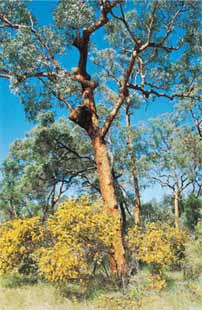Topic 1.1 Ecosystem Services
What are Ecosystem Services?
Considerable attention has been given to the concept of ecosystem services (ESS) by ecologists and economists over the last decade as we’ve developed a greater understanding of how important our ecosystems are and the need to interact sustainably with our environment.
Definition of Ecosystem Services
 Ecosystem services have formally been defined as "…the conditions and processes by which natural ecosystems, and the species that make them up, sustain and fulfill human life" (Daily, 1999).
Ecosystem services have formally been defined as "…the conditions and processes by which natural ecosystems, and the species that make them up, sustain and fulfill human life" (Daily, 1999).
What this means is that ecosystems and their natural processes (e.g., photosynthesis, pollination, decomposition of dead organisms, soil formation from weathered rock and organic matter) provide benefits for humans and without these benefits we would not be able to inhabit the earth.
You may have noticed that Daily's definition of ecosystem services specifically refers to the services derived from natural ecosystems where humans have had minimal impact. However we also receive benefits from human made and human altered ecosystems (e.g., agricultural land, urban parks). In more technical terms the "natural" biotic, chemical and physical processes of agricultural-ecosystems and urban-ecosystems are also important in providing ecosystem services to sustain human life.
Expanded Definition of Ecosystem Services
Therefore a more useful definition of ecosystem services is that they are the conditions and processes by which all ecosystems, and the species and other parts that make up ecosystems, sustain and fulfill human life.
Thus the concept of ecosystem services is human centred (anthropocentric) and provides a way of understanding how important ecosystems and the ways they work are for supporting life and providing for human needs. We need to understand how ecosystems work so that we don’t negatively affect these processes.
Therefore by considering ecosystem services we will have a better understanding of the relationship between humans and their environment (i.e. our dependence on ecosystems, particularly natural ecosystems) and ultimately be able to manage our natural resources more sustainably. At this stage you will most probably be unsure how an understanding of ecosystem services will be able to direct natural resource management in this way. We will reflect back on this statement at the end of this module and in the final module of this course and see how your response to this statement may have changed.
![]()
Activity 1.1
Read page 1 of the Ecosystem Services Fact Sheet ![]() web site and answer these questions:
web site and answer these questions:
- What are ecosystems?
- Using the above information and the ESS fact sheet define ecosystem services in the way you think is most useful for explaining what they are to other people?
- With reference to both the information given in this section and additional resources, make a list of five (5) ecosystem services giving a brief definition of each service. We've started here with two examples.
| Ecosystem Services | Definition |
| Gas regulation | Regulation of the earth?s atmosphere to maintain it?s chemical composition suitable for human life |
| Natural Pest Control | Regulation of population size by other organisms (i.e. natural enemies such as predators, parasites and pathogens) or by climatic variables and landscape characteristics that restrict population growth |
![]()
Why is the Concept of Ecosystem Services Important?
The concept of ecosystem services is important for many reasons including:
- Humans rely on ecosystem services.
- Ecosystems provide these services when they are working well.
- Most ecosystem services are greatly undervalued by society because they are considered "free" and inexhaustible, i.e., we don't have formal markets to buy and sell most ESS.
- This lack of awareness of the value of ecosystems helps drive the conversion of natural ecosystems into other systems that produce marketable goods (e.g., by clearing a forest to sell the timber, converting bushland to cropland) thereby disrupting or deminishing the ecosystem processes (e.g., clearing forests reduces carbon storage, reduces soil protection from the erosive impact of rain or overland flow).
- Current trends suggest that we are in the process of dramatically altering our ecosystems and that these changes could have severely detrimental effects on the future provision of ESS and our quality of life.
